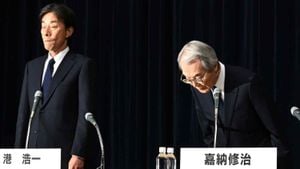The Bank of Japan (BOJ) is poised to make significant changes to its monetary policy, as expectations mount for the central bank to raise its policy interest rate from 0.25% to 0.5% during the upcoming monetary policy meeting to be held on April 24, 2025. This decision would mark the first rate hike since July 2022 and set the interest rate at its highest level since October 2008.
Analysts note this anticipated increase reflects the prevailing economic conditions characterized by rising inflation rates surpassing the BOJ's target of 2%, as well as forecasts of substantial wage increases across various segments of the economy, particularly among small and medium-sized enterprises. According to the Nikkei Asian Review, Kazuo Ueda, the Governor of the BOJ, underscored the relevance of these changes: "Inflation is consistently above the BOJ's target, which supports the rationale for the increase."
The BOJ's monetary policy meeting, which begins today, has generated widespread interest as financial markets react to the potential impacts of this decision. The discussions leading to the hike are influenced by various domestic and global economic factors, including the U.S. economic climate under President Trump’s administration, which significantly affects Japanese markets. Observers note, "The market has largely absorbed expectations of this rate hike, minimizing potential shocks," reported by Reuters.
Ueda has indicated previously, "We have noted positive wage dynamics, which are significant for our decision-making process," signifying the BOJ's attentiveness to economic trends affecting labor costs. With wage negotiations expected to intensify during the spring labor negotiations, or 'Shunto', this signals to the BOJ the time is ripe for tightening monetary policy.
The decision to proceed with the interest rate hike aligns with BOJ's broader strategy to normalize monetary policy, especially after exiting the negative interest rate era and gradually eleving rates during 2023. If approved, this will be the BOJ's third rate hike since exiting negative territory, emphasizing the commitment to achieving financial stability.
Various sectors, including finance and real estate, have positioned themselves accordingly. The anticipated hike could lead to stronger yen valuation and potential shifts within investor portfolios, especially for those holding riskier assets such as cryptocurrencies. With the BOJ's looming decision, the global cryptocurrency market has already displayed signs of volatility. A representative from the cryptocurrency sector remarked, "Japan's interest rate increase may result in rising yen preferences, potentially lowering appetite for riskier assets."
Despite the uncertainty surrounding economic policies both domestically and abroad, many investment firms express confidence. A recent report by NH Investment & Securities suggested, "The tightening stance by the BOJ, combined with the normalization of monetary policies, may lead to more substantial yen gains against the dollar, providing opportunities to investors."
Investors are acutely aware of the historical significance of this decision. If executed, this will occur after the BOJ's landmark moves since earlier this year; raising the interest rate significantly impacts the global market, especially as Japan's last hike surprised many analysts across the board. Any movement on this front could lead to shifts not just in currency values but also within sectors reliant on stable interest rates for growth.
Should the BOJ enact the increase, the wider economic reverberations will be closely monitored, particularly how Japanese economic stability holds against the backdrop of global uncertainties, including geopolitical tensions and shifting policies of the U.S. under President Trump. The eventual decision and its aftermath will highlight the BOJ's role as stabilizer within both local and international economic landscapes.
Analysts caution, though, there remains some unpredictability. Unforeseen developments, be they political or economic, could influence the bank's rationale moving forward, with many advocating for prudent policymaking amid these uncertainties. The announcement is anticipated to proceed fluidly without any voting delays from related ministries, signifying unified support for this adjustment.
Overall, the Bank of Japan's possible interest rate hike could establish new benchmarks for monetary policy orientation, prompting investor diversification strategies and instilling both optimism and caution across markets. Market participants eagerly await the outcome of the BOJ's decision and its wider impact on the economy as the rate insights shed light on Japan's response to current and prevailing economic pressures.



